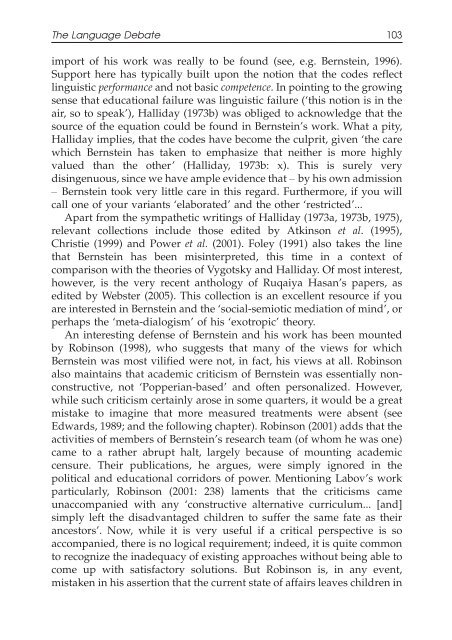Language Diversity in the Classroom - ymerleksi - home
Language Diversity in the Classroom - ymerleksi - home
Language Diversity in the Classroom - ymerleksi - home
- No tags were found...
You also want an ePaper? Increase the reach of your titles
YUMPU automatically turns print PDFs into web optimized ePapers that Google loves.
The <strong>Language</strong> Debate 103import of his work was really to be found (see, e.g. Bernste<strong>in</strong>, 1996).Support here has typically built upon <strong>the</strong> notion that <strong>the</strong> codes reflectl<strong>in</strong>guistic performance and not basic competence. In po<strong>in</strong>t<strong>in</strong>g to <strong>the</strong> grow<strong>in</strong>gsense that educational failure was l<strong>in</strong>guistic failure (‘this notion is <strong>in</strong> <strong>the</strong>air, so to speak’), Halliday (1973b) was obliged to acknowledge that <strong>the</strong>source of <strong>the</strong> equation could be found <strong>in</strong> Bernste<strong>in</strong>’s work. What a pity,Halliday implies, that <strong>the</strong> codes have become <strong>the</strong> culprit, given ‘<strong>the</strong> carewhich Bernste<strong>in</strong> has taken to emphasize that nei<strong>the</strong>r is more highlyvalued than <strong>the</strong> o<strong>the</strong>r’ (Halliday, 1973b: x). This is surely verydis<strong>in</strong>genuous, s<strong>in</strong>ce we have ample evidence that by his own admission Bernste<strong>in</strong> took very little care <strong>in</strong> this regard. Fur<strong>the</strong>rmore, if you willcall one of your variants ‘elaborated’ and <strong>the</strong> o<strong>the</strong>r ‘restricted’...Apart from <strong>the</strong> sympa<strong>the</strong>tic writ<strong>in</strong>gs of Halliday (1973a, 1973b, 1975),relevant collections <strong>in</strong>clude those edited by Atk<strong>in</strong>son et al. (1995),Christie (1999) and Power et al. (2001). Foley (1991) also takes <strong>the</strong> l<strong>in</strong>ethat Bernste<strong>in</strong> has been mis<strong>in</strong>terpreted, this time <strong>in</strong> a context ofcomparison with <strong>the</strong> <strong>the</strong>ories of Vygotsky and Halliday. Of most <strong>in</strong>terest,however, is <strong>the</strong> very recent anthology of Ruqaiya Hasan’s papers, asedited by Webster (2005). This collection is an excellent resource if youare <strong>in</strong>terested <strong>in</strong> Bernste<strong>in</strong> and <strong>the</strong> ‘social-semiotic mediation of m<strong>in</strong>d’, orperhaps <strong>the</strong> ‘meta-dialogism’ of his ‘exotropic’ <strong>the</strong>ory.An <strong>in</strong>terest<strong>in</strong>g defense of Bernste<strong>in</strong> and his work has been mountedby Rob<strong>in</strong>son (1998), who suggests that many of <strong>the</strong> views for whichBernste<strong>in</strong> was most vilified were not, <strong>in</strong> fact, his views at all. Rob<strong>in</strong>sonalso ma<strong>in</strong>ta<strong>in</strong>s that academic criticism of Bernste<strong>in</strong> was essentially nonconstructive,not ‘Popperian-based’ and often personalized. However,while such criticism certa<strong>in</strong>ly arose <strong>in</strong> some quarters, it would be a greatmistake to imag<strong>in</strong>e that more measured treatments were absent (seeEdwards, 1989; and <strong>the</strong> follow<strong>in</strong>g chapter). Rob<strong>in</strong>son (2001) adds that <strong>the</strong>activities of members of Bernste<strong>in</strong>’s research team (of whom he was one)came to a ra<strong>the</strong>r abrupt halt, largely because of mount<strong>in</strong>g academiccensure. Their publications, he argues, were simply ignored <strong>in</strong> <strong>the</strong>political and educational corridors of power. Mention<strong>in</strong>g Labov’s workparticularly, Rob<strong>in</strong>son (2001: 238) laments that <strong>the</strong> criticisms cameunaccompanied with any ‘constructive alternative curriculum... [and]simply left <strong>the</strong> disadvantaged children to suffer <strong>the</strong> same fate as <strong>the</strong>irancestors’. Now, while it is very useful if a critical perspective is soaccompanied, <strong>the</strong>re is no logical requirement; <strong>in</strong>deed, it is quite commonto recognize <strong>the</strong> <strong>in</strong>adequacy of exist<strong>in</strong>g approaches without be<strong>in</strong>g able tocome up with satisfactory solutions. But Rob<strong>in</strong>son is, <strong>in</strong> any event,mistaken <strong>in</strong> his assertion that <strong>the</strong> current state of affairs leaves children <strong>in</strong>
















